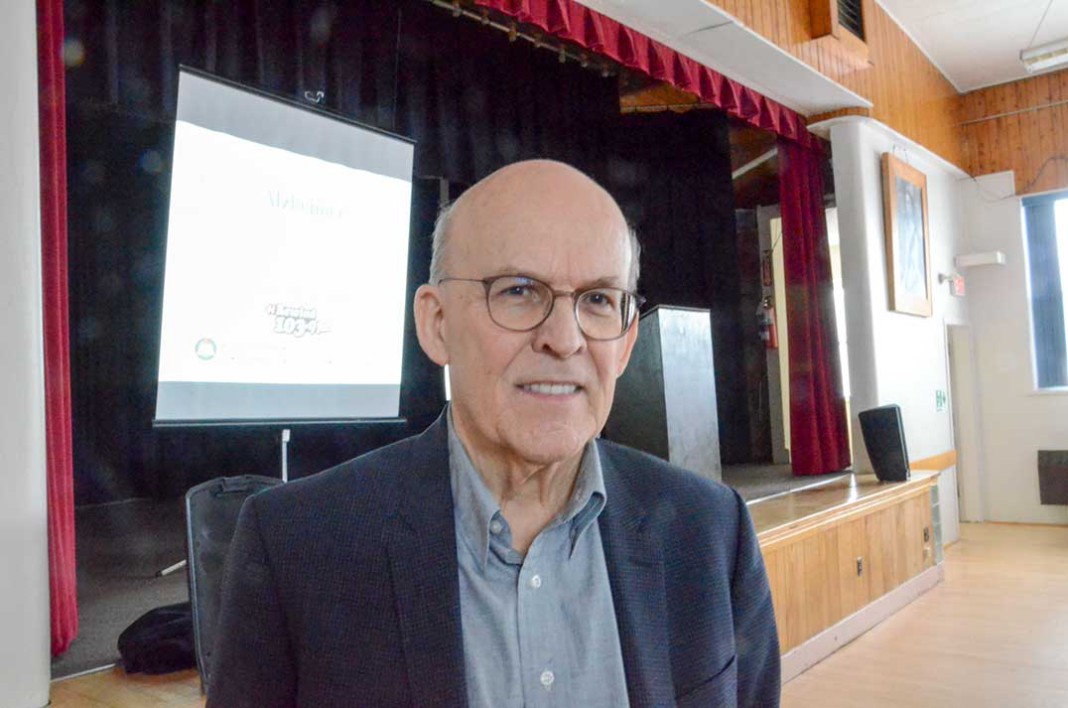MINDEMOYA—The Alzheimer Society Sudbury-Manitoulin North Bay and Districts’ Circle of Hope came to Manitoulin on Thursday, January 28, filling the Mindemoya Community Hall with those seeking to learn more about living well with dementia.
The keynote speaker for the event was Dr. Guy Proulx, an Ottawa psychologist who specializes in memory disorders, clinical neuropsychology (brain and behaviour).
A full professor at York University’s Glendon Campus, Dr. Proulx specializes in the assessment and rehabilitation of cognitive disorders in people who have strokes and dementias and he integrates neuropsychological approaches to help minimize disability due to cognitive disorders. His experience in the field actually started at age 16, when he worked as an orderly in a chronic care facility.
Dr. Proulx used his 40-odd years of experience and study to help demystify dementia and not only cope with brain diseases like Alzheimer’s, but also transfer the knowledge garnered from current research in the field to practical applications to assist people in pushing back against the symptoms that degrade the quality of life.
“When I started, the average age in a long-term care facility was 69,” he said. “Today that average is 85.”
With a steadily aging population, those coping skills are going to play an ever-increasing role in enabling people to stay in their homes longer. At age 60, there are about nine percent of that cohort who have some form of dementia, by age 70 that number doubles to 18 percent and by age 80 the number jumps to almost a third (30 percent).
The good news is that the prevalence of dementia is actually going down in the population, by percentage, notes Dr. Proulx, but in real numbers, due to the quickly increasing number of elderly, the number of patients is still rising. The decrease in percentage of the population being impacted by the diseases of aging is likely due to lifestyle changes in the general population, he points out. One of the key weapons on the health battlefield when dealing with dementia is becoming ever-clearer in the research. “Better start early,” said Dr. Proulx. “We need to look at kids in our schools who are at risk.”
“Aging starts early,” pointed out Dr. Proulx. “If we start to deal with the issues early, we can make a real difference.”
Not that early intervention will be a complete magic bullet, eradicating dementia at its roots. Due to the genetic roll of the dice, some people will still be afflicted, but Dr. Proulx estimates that as much as 20 percent of incidents can be averted. “In terms of the numbers in Ontario, that 20 percent is 40,000 people,” he said. “Look at the cost. That is a lot of health dollars.”
Dr. Proulx also pointed out that we need to be looking at a new terminology in dealing with health over time. He used the term “healthspan,” a term that is growing in many jurisdictions, like Japan, to describe that portion of a person’s lifespan where they are in optimum health.
By increasing a person’s healthspan, they are able to remain in their own homes much longer and to maintain a greater quality of life overall. The implications of increasing people’s healthspan for Ontario’s health system, and the aging themselves, are immense, considering the cost of placing people in long-term care facilities where a co-pay of around $30,000 a year can quickly whittle down retirement reserves and family assets.
Although rural residency, in regions such as Manitoulin Island, poses numerous challenges to helping maintain people in their own homes, Dr. Proulx noted that there are also many advantages as well. “There is a greater sense of community in rural areas,” he pointed out. “It is a much greater challenge to get the community involved in a city like Toronto, for instance.” The role played by social engagement in delaying or preventing some dementia symptoms is well documented.
During the Circle of Hope a number of exhibitors were on hand, including health agencies such as Noojmowin Teg Health Services, Mnaamdzawin Health Services and many displays featured games to improve cognitive function and healthy lifestyle choices such as food.
Alzheimer’s Society staff Dana Crane, family councillor and educator, and Alison Sloss, health promotion worker, took the participants through the background of dementia, its many forms and the clinics, workshops and support groups available on Manitoulin, in Sudbury and Espanola.
The duo introduced 47-year-old Mary Beth Wighton, a woman diagnosed at 45 with lewy body dementia (lewy body dementia is a form of dementia that occurs because of abnormal deposits of a protein called alpha-synuclein inside the brain’s nerve cells) who has refused to give in to her diagnosis. Ms. Wighton’s presentation came by way of a YouTube video that can be accessed at www.youtube.com/watch?v=FxIHLE4fXok.
In the past, being diagnosed with dementia was one of the most feared aspects of aging, but as Ms. Crane pointed out, “dementia is not a normal part of aging” and, if you think you may have dementia, it is important to learn about it early.
The unfortunate tendency of people who have been diagnosed with dementia to hide the fact from friends and family can create not only misunderstandings and unnecessary conflict, but also contributes greatly to the cycle of isolation that exacerbates the condition.
A movement is underway to bring dementia out from the shadows and into the light, so that communities can become part of the solution and, through familiarity and education, lead to a greater healthspan for everyone.
One such campaign, explained the workers, is the Blue Umbrella Campaign, being piloted in Peterborough. Through this campaign, the community is being enlisted to create a dementia friendly community. The term dementia friendly is becoming popular to describe a variety of program initiatives with a common goal: “to design communities that are inclusive of people with dementia, designed to support their unique needs, that allow them and all residents to ‘live well’.” The Blue Umbrella program helps those living with dementia engage in the community for longer periods of time.
As part of the program, those with dementia wear a blue umbrella, helping the community to assist them in living well. It is hoped that the pilot program will spread across the country.




